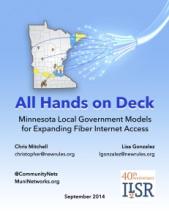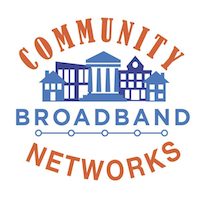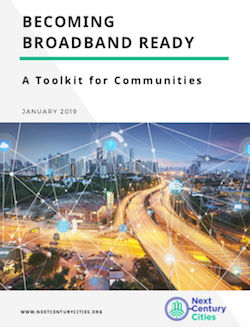
Fast, affordable Internet access for all.


In January 2015, President Barak Obama appeared in Cedar Falls, Iowa, to present his administration's plan to encourage local choice and competition through community networks. The President's strategy includes eliminating barriers to local telecom authority that now exist in 19 states.
The Broadband That Works: Promoting Competition & Local Choice In Next-Generation Connectivity fact sheet, released by the White House Office of the Press Secretary on the eve of the appearance, provides info on several communities served by munis and the benefits they have enjoyed. The fact sheet also outlines five steps the administrations proposes to improves access, adoption, and investment.
For more detailed information, download the accompanying report by the National Economic Council and Council of Economic Advisors.

Update: Read an updated version of this report, published in July 2021, here, titled Minnesota Broadband: Land of 10,000 Connectivity Solutions [pdf]. It revisits all of the below communities to see how they fared over the intervening years, while adding new counties, communities, and, for the first time, two local Internet Service Providers.
Original Report: Minneapolis, MN —In 2010 the Minnesota legislature set a goal: universal access to high speed broadband throughout the state by 2015. As 2015 approaches we know that large parts of Greater Minnesota will not achieve that goal, even as technological advances make the original benchmarks increasingly obsolete.
But some Minnesota communities are significantly exceeding those goals. Why? The activism of local governments.
A new report by ILSR, widely recognized as one of the most knowledgeable organizations on municipal broadband networks, details the many ways Minnesota’s local governments have stepped up. “All Hands On Deck: Minnesota Local Government Models for Expanding Fiber Internet Access” includes case studies of 12 Minnesota cities and counties striving to bring their citizens 21st century telecommunications.
Our readers have heard the media murmur around municipal networks steadily grow to a loud hum during the past year. An increasing number of local press outlets have taken the opportunity to express their support for municipal networks in recent months.
In communities across the U.S. letters to the editor or editorial board opinions reflected the hightened awareness that local decisionmaking is the best answer. Support is not defined by political inclination, geography, or urbanization.
Last fall, several Colorado communities asked voters to decide whether or not to reclaim local telecommunications authority hijacked by the state legislature and Qwest (now CenturyLink) lobbyists in 2005. Opinion pieces from local political and business leaders in the Denver Post and the Boulder Daily Camera encouraged voters to support the measures. Downtown Boulder Inc. and the Boulder Chamber wrote:
Clearly a transparent public process is appropriate for identifying the best path to higher-speed infrastructure. One thing is certain. Approving the exemption to State Law 152 is a step in the right direction.
Expensive service, poor quality connections, and limited access often inspire local voices to find their way to the news. Recently, City Council Member Michael Wojcik from Rochester, Minnesota, advocated for a municipal network for local businesses and residents. His letter appeared in the PostBulletin.com:
If we want to control our broadband future, we need to join successful communities such as Chattanooga, Tenn., and Lafayette, La., and create a municipal fiber network. In many cities around the world, residents get 1 gigabyte, bidirectional Internet speeds for less than $40 per month. In Rochester, I get 1 percent of those speeds for $55 per month. I believe if Bucharest, Romania, can figure this out, Rochester can as well.
Recently, we reported that ECFiber in Vermont plans to expand in the near future. To fund that expansion, the consortium will seek out new, larger scale funding to meet the increased demand. ValleyNet, Inc., the company that manages the FTTH network for ECFiber is now searching for a Managing Director. The full posting is listed below and can be viewed at the NTCA Rural Broadband Association Job Center.
In keeping with the community goals of the network, we found value in this particular specification:
Community Foundation: In view of the above, the MD must fully appreciate and embrace the concept of a community-owned public utility and be able to relate successfully to: the individual towns; their governing bodies (“Select Boards”); the ECFiber Governing Board and its members; and with the citizens themselves. Although ECFiber is required by law and constitution to be entirely self-supporting and to “pay its own way”, it is not a purely “profit-maximizing” institution. Balancing the needs of the community with the commercial discipline required to fund all its activities without resorting to taxpayer funding sources is a basic requirement of the MD’s position.
Jim Baller and Joanne Hovis, two leading voices in the drive to restore local authority, recently spoke with Craig Settles on Gigabit Nation. Baller and Hovis, the President and the CEO, of The Coalition for Local Internet Choice (CLIC) spent about an hour discussing how CLIC is finding ways to help businesses, individuals, and public entities work with elected officials to retain or regain the right for local authority.
From the Gigabit Nation website:
Listeners gather insights to working with willing incumbents, developing public-private partnerships, establishing their own networks when necessary, or creating other inventive approaches that work for their communities. Both guests share their many years of experience in helping communities obtain the many benefits of advanced communications capabilities. Baller and Hovis formed CLIC to give voice to the wide range of public and private interests that support local choice and to provide communities practical advice and the tools necessary to prevent new state barriers from being enacted and to remove existing barriers.
In early December, the East Central Vermont Community Fiber Network (ECFiber) announced that it is once again expanding, bringing the network to 200 miles by the end of 2014. According to the press release, the network will reach into an additional 8 towns in 2015, in part due to dark fiber deployed in cooperation with the Vermont Telecommunications Authority.
From the press release:
“We’re pleased that residents of these areas are now able to enjoy the benefits of locally grown, full time, state-of-the-art real broadband,” said Irv Thomae, Chairman of ECFiber and Governing Board delegate from Norwich.
Over 400 households have invested in the network thus far, but Thomae goes on to note that the consortium will pursue larger scale funding in 2015 in order to obtain the necessary funds to expand at a quicker pace. Currently, local investors fund the network by purchasing tax-exempt promissory notes.
Subscribership has continued to climb. Last spring, we reported on the 600th sign-up but now ECFiber is at nearly 1,000 customers. There are currently 24 member towns in the consortium.
Even guys who don't support Title II handling of the Internet support local authority. Even if those guys are cigar smokin', basketball-team buyin', swimmin'-with-the-shark type guys. We are referring to a recent interview with entrepreneur Mark Cuban in the Washington Post.
While the interview covered Cuban's fear that changes may stifle innovation, we zeroed in on one particular question and his very astute response:
WP: Cities in Colorado have recently bucked a spate of recent bans on municipal broadband and approved letting themselves build their own ISPs. Do you support government getting involved in broadband in that way?
Cuban: I love it. I have no problem with it at all.
(Image of Mark Cuban from his Twitter page @mcuban)

Many people have come to us for advice on how to get started on an effort to improve Internet connectivity. We've created resources to help you and your community and have curated materials from other organizations to help as you seek a path to better Internet access. Please let us know if you have suggestions or additional comments by emailing us - broadband@muninetworks.org.
An increasing number of municipalities and cooperatives are investing in telecommunications infrastructure to serve public facilities, local businesses, and residences (see our map here). They're filling the gaps created by large national cable and telephone companies, which have focused their investments in primarily areas with assured returns. As a result, rural areas and urban regions with higher concentrations of low-income households don't have the Internet access they need. Often the infrastructure just isn't there; sometimes it's unaffordable.
In order to correct these errors and bring fast, affordable, reliable connectivity to all of their citizens, communities are implementing change at the local level. Each municipality, county, and region is unique, and so need to review potential policies to determine which suit their community and vision.
 In the summer of 2019, Next Century Cities (NCC) released the Becoming Broadband Ready Toolkit, the most comprehensive resources we've seen to help local communities. This comprehensive resource covers considerations from early in the process to determining success throughout implementation. In addition to offering guidance with examples from across the country, the toolkit offers links to other resources, such as model ordinances, reports, podcasts, and organizations laser-focused on specific and relevant issues.
In the summer of 2019, Next Century Cities (NCC) released the Becoming Broadband Ready Toolkit, the most comprehensive resources we've seen to help local communities. This comprehensive resource covers considerations from early in the process to determining success throughout implementation. In addition to offering guidance with examples from across the country, the toolkit offers links to other resources, such as model ordinances, reports, podcasts, and organizations laser-focused on specific and relevant issues.
The toolkit organizes material into overreaching themes, such as building community support, establishing policies to encourage investment, and the pros and cons if publicly owned models, among many other considerations. Within each broad topic, however, NCC has dug deep into specifics, such as addressing simplified permitting practices, creating digital inclusion plans, and ways to work around legislative or regulatory barriers. Throughout the toolkit, NCC turned to the many members of the organization for real-world examples of workable solutions.
Download the toolkit from the NCC website here
Over the years, we've also developed resources that can help educate and spread the word about the benefits of community networks as your project moves forward. Whether your project begins at the grassroots with regular folks in the community or in City Hall, these resources are easily accessible and help explain why community networks are a potential alternative.
Resources
Tools:
The recent Colorado elections in Boulder, San Miguel County, Yuma County, Rio Blanco County, Wray, Yuma, Red Cliff, and Cherry Hills Village have inspired Estes Park. According to a recent Trail Gazette article, the northern town will hold a special election in February to ask voters to reclaim telecommunications authority. Approximately 5,800 people live in Estes Park.
The local Estes Park Economic Development Corporation (EDC) adopted a resolution in August urging the town council to take the issue to the voters reports the Trail Gazette. The council voted unanimously to support that idea.
"This resolution resulted from an extensive investigation into how to achieve a key goal in the Town's 2014 strategic plan: 'to encourage optimal use of the Platte River Power Authority's and Town's fiber optic infrastructure,' " [EDC's David] Batey said.
…
"We must take back the Town's right to decide the best way to provide competitive broadband," Batey said.
"Like electricity a century ago, broadband is a foundation for economic growth, job creation, global competitiveness and a better way of life," stated the EDC.
The town and the Platte River Power Authority (PRPA) share ownership of a fiber optic network between Estes Park and nearby Loveland. The ring was installed about 10 years ago for operation of the PRPA Transmission and Substation Electric System. Flooding in 2013 eliminated the other telecommunications infrastructure connecting Estes Park to the outside world, so there is no redundancy.
The City leases several of its fibers to Level 3 for a little over $1,600 per month but connectivity in town varies. Some areas rely on dial-up while others have DSL. There are also several smaller Wi-Fi providers working in the area.
Yesterday, Colorado voters in three counties and five municipalities were asked whether they want to restore local government authority to build or partner for broadband networks. A 2005 law, lobbied for heavily by incumbents, prevents local municipalities from offering telecommunications services, even if they already have the infrastructure in place.
According to the law, local communities can ask voters to reclaim local authority to establish a telecommunications utility. We have seen Longmont, Montrose, and Centennial take action in prior years. In Longmont, the community has successfully established a telecommunications utility and the community is loving it.
An interesting wrinkle in Colorado is the wide support across the state - communities that vote heavily for Democrats supported local authority for municipal networks in similar numbers that those in areas voting heavily for Republicans.
In Yuma County, where approximately 85% of voters supported the GOP Senate candidate, the measure to reclaim local authority passed with 72% of the vote. Yuma County overwhelmingly voted for the Republican candidate for Governor and every race in Yuma County went to a Republican candidate. The cities of Yuma and Wray within the County also had their own ballot initiatives to reclaim local authority; those ballot measures also passed by 72%.
Rio Blanco County's numbers were very similar to those in Yuma County. The only exception was that their ballot question 1A on reclaiming local authority passed with 76%. Again, every race went to a Republican candidate in Rio Blanco County.